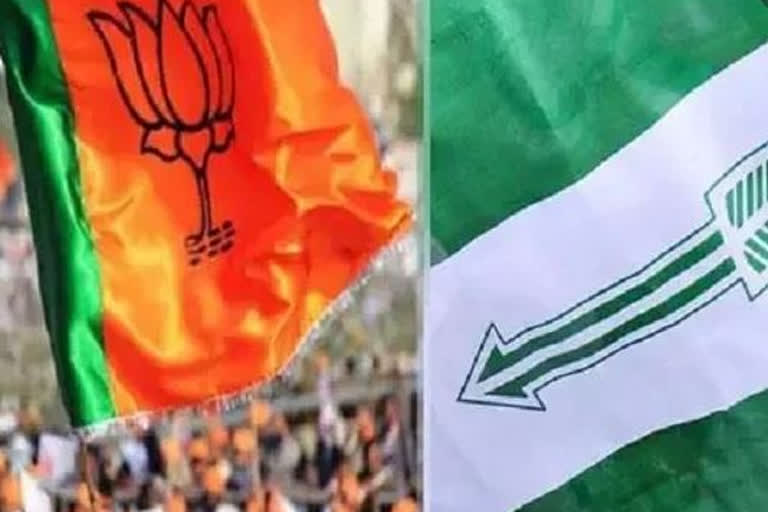Patna:The alliance between JDU and BJP was made way back in 1996 when the then Samta Party had offered support to the 13-day BJP government at the Centre led by Atal Bihar Vajpayee. The Samta Party had earned good respect for their support and again the BJP-JDU alliance performed better in the 1999 general election in Bihar.
It was in 2000, when for the first time Nitish Kumar had become the chief minister of Bihar for a week as he failed to muster the majority and returned as a minister at the Centre in the government of Vajpayee.
After five years, both JDU and BJP contested an assembly election in February 2005 and were willing to form an alliance government, however, the state soon witnessed President's rule and the plan never took off. Later in October of that year, the assembly election was held and Nitish returned to power. In 2010, the coalition won a landslide victory in the assembly poll.
It was the same year, when Nitish for the first time got upset with BJP when a series of advertisements were published in which the then Gujarat CM Narendra Modi had offered a Rs 5 crore cheque to Nitish for Kosi flood relief in 2010. Miffed over it, Nitish had rejected Rs 5 crore cheque and had also canceled the dinner with the BJP leaders which had humiliated the saffron party most.
Another sensitive factor between JDU and BJP was Nitish's demand for special category status for Bihar which has not been fulfilled yet by the NDA government led by PM Narendra Modi at the Centre. In fact, to showcase his strength, Nitish held an Adhikar rally in Patna demanding special category status for Bihar in March 2013. In the same month, JDU expressed their reservation over the induction of Modi into the BJP's parliamentary board.
Later, JDU passed a resolution in its national executive committee meeting saying that the NDA prime minister candidate should have secular credentials. Later, JDU expressed displeasure when Modi was made the head of the BJP's election committee. At that time, Sharad Yadav was heading JDU along with Nitish and in June 2013, Nitish walked out of alliance with BJP ending their 17-year-old relationship with the saffron party.
In 2015, Nitish contested the assembly election in alliance with RJD and Congress but abruptly made an exit from the alliance in July 2017. However, in less than 24 hours, he returned as CM and formed the government with the support of the BJP dumping the Grand Alliance. However, of late, the relationship between JDU and BJP in Bihar has turned bitter and it ended up as a 'cat and mouse game' with one trying to run down the other by citing 'ideological differences.'
Sharing his views on the long journey of BJP and JDU in Bihar, Patna-based political expert Dr. Sanjay Kumar says that Bihar witnessed good development under the NDA regime. “Leaving aside a few years, Bihar has witnessed a golden era in the regime of BJP and JDU. No doubt, most of the development in Bihar took place under the NDA regime in the state. Be it the construction of bridges, better roads, electricity, or a panchayat system, it all became an example for other states. Thanks to the vision of Chief Minister Nitish Kumar who led a successful government with the BJP for almost twenty years now. The credit for the development should go to both JDU and BJP, not only Nitish.”
He further added, “Nitish was always on the driving seat since the beginning. But only in 2020, BJP began to poke its nose and made the life of Nitish difficult. Time and again, BJP leaders targetted Nitish and ridiculed his governance. There could be other reasons like improper representation for the party in Union Cabinet which could have annoyed Nitish a bit," he said and added, 'It remains to be seen, what Nitish's next move would be."
